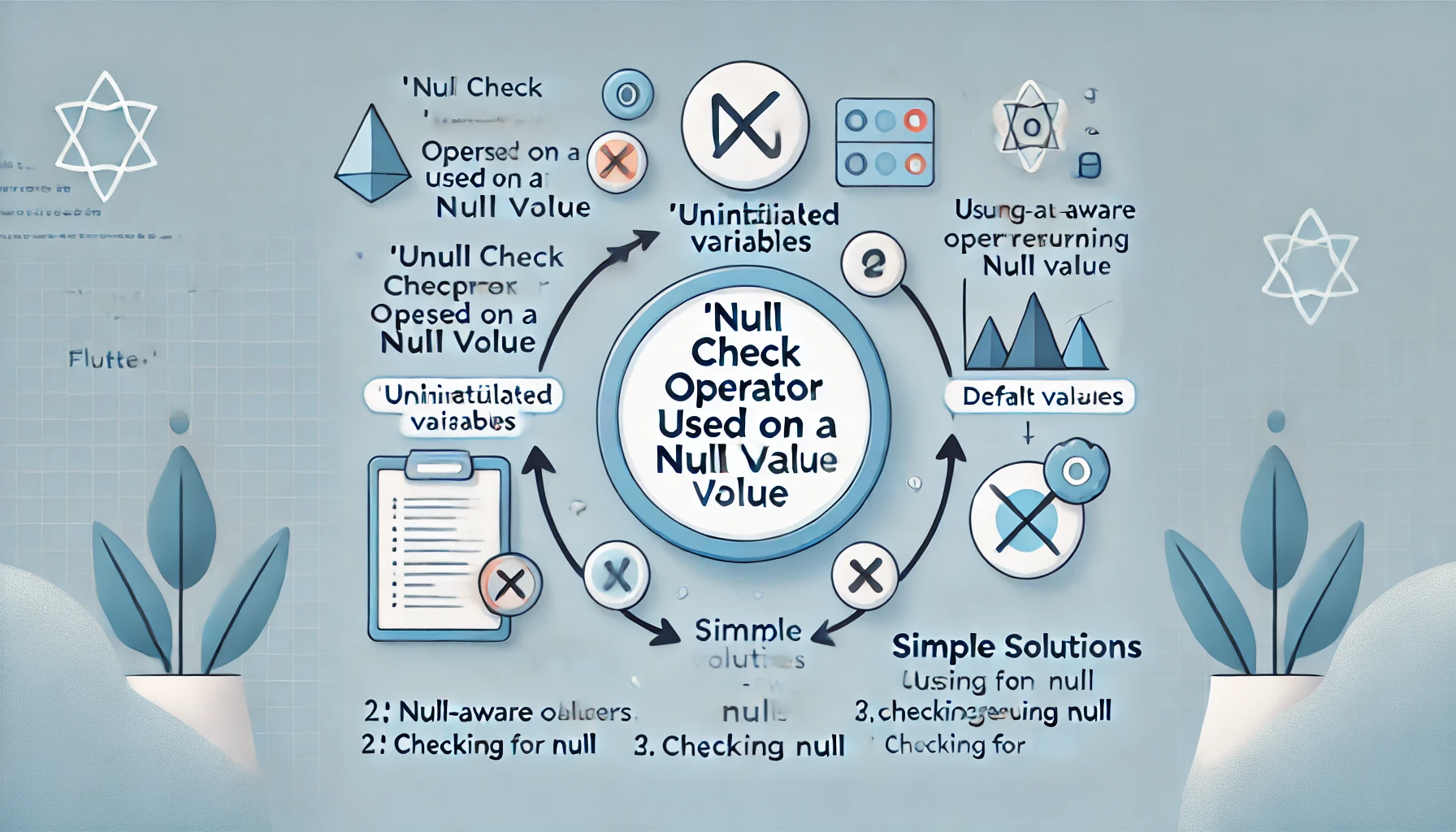The error “Null check operator used on a null value” occurs in Flutter when you use the null check operator (!) on a variable that is unexpectedly null. This results in a runtime exception, causing the app to crash.
Flutter follows null safety, which means variables can be nullable (String?) or non-nullable (String). The ! operator is used to forcefully assert that a nullable variable is not null, but if it actually holds null, then this error occurs.
Common Causes and Solutions
Let’s go through the possible reasons why this error occurs and how to fix it.
1. Uninitialized Variable
Issue:
A nullable variable is declared but not initialized before using the ! operator.
Example Code:
void main() {
String? name;
print(name!.length); // ❌ Throws error if name is null
}
Why does this happen?
nameis declared as a nullable variable (String?).- Since
nameisnull, applying!(which assumes the value is non-null) causes a runtime error.
Solution:
- Option 1: Use a default value (
??)
void main() {
String? name;
print(name?.length ?? "No Name"); // ✅ Safe usage
}
- Option 2: Ensure the variable is initialized before usage
void main() {
String name = "Krishna"; // ✅ Assign a value
print(name.length);
}
2. Using ! on a Late-Initialized Variable
Issue:
A late variable is declared but not assigned before being used.
Example Code:
void main() {
late String name;
print(name.length); // ❌ Throws error if name is not assigned
}
Why does this happen?
latevariables must be assigned before use. If not, accessing them leads to an error.
Solution:
Ensure the variable is assigned before usage.
void main() {
late String name;
name = "Krishna"; // ✅ Assign value before usage
print(name.length);
}
3. Null Passed from an API or Database
Issue:
Fetching data from an API or database returns null, but the code assumes a non-null value.
Example Code:
String fetchUserName() {
return null!; // ❌ API returned null
}
Solution:
- Use null checks (
ifcondition) before accessing the value
void main() {
String? userName = fetchUserName();
if (userName != null) {
print(userName.length); // ✅ Safe usage
} else {
print("User not found");
}
}
String? fetchUserName() {
return null; // Simulating API response
}
- Use a fallback/default value
void main() {
String userName = fetchUserName() ?? "Guest";
print(userName.length); // ✅ Avoids null error
}
String? fetchUserName() {
return null;
}
4. Using ! on a Nullable Widget Property
Issue:
When working with widgets, properties marked as nullable may be null, but using ! on them can cause this error.
Example Code:
class MyWidget extends StatelessWidget {
final String? title;
MyWidget({this.title});
@override
Widget build(BuildContext context) {
return Text(title!); // ❌ Throws error if title is null
}
}
Solution:
- Use a default value (
??)
Text(title ?? "Default Title")
- Use null-aware operators
if (title != null) {
return Text(title!);
} else {
return Text("Default Title");
}
5. Null Values in List or Map
Issue:
A list or map might contain null values, and using ! without checking can cause errors.
Example Code:
void main() {
List<String?> names = ["Alice", null, "Bob"];
print(names[1]!.length); // ❌ Throws error if names[1] is null
}
Solution:
- Check for null before accessing the value
void main() {
List<String?> names = ["Alice", null, "Bob"];
if (names[1] != null) {
print(names[1]!.length);
} else {
print("Name is null");
}
}
- Use null-aware operators
print(names[1]?.length ?? "No Name");
6. Flutter Provider / State Management Issues
Issue:
When using Provider, GetX, or other state management solutions, values may not be initialized before being accessed.
Example Code (Provider):
final myProvider = Provider.of<MyProvider>(context, listen: false);
print(myProvider.data!.length); // ❌ Throws error if data is null
Solution:
- Ensure the data is not null before accessing
if (myProvider.data != null) {
print(myProvider.data!.length);
} else {
print("Data not available");
}
- Provide default data
print(myProvider.data ?? "No Data Available");
Best Practices to Avoid This Error
✅ Use ? instead of !
print(name?.length);
✅ Use ?? to provide a fallback value
print(name ?? "Default Name");
✅ Check for null before using !
if (name != null) {
print(name!.length);
}
✅ Use required for essential variables in constructors
class MyClass {
final String name;
MyClass({required this.name});
}
✅ Avoid using ! unless you’re 100% sure the value is non-null.
Conclusion
The “Null check operator used on a null value” error occurs when ! is used on a null variable. The best way to fix it is by using null-aware operators (?, ??), checking for null before accessing values, and ensuring variables are initialized properly.
By following null safety best practices, you can prevent runtime crashes and build more stable Flutter applications. 🚀










